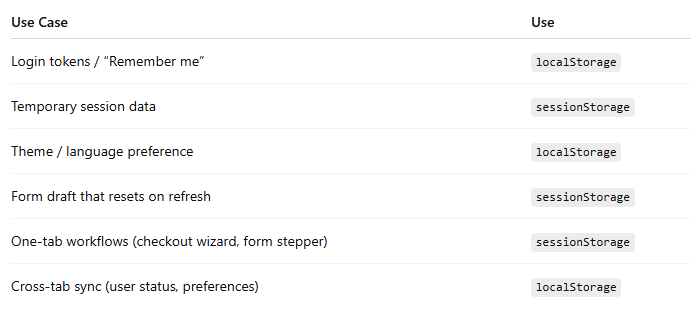They look similar, but they behave completely differently, and knowing the difference can save you from serious data bugs.

Introduction
It’s one of those things every frontend dev thinks they understand…
localStorage.setItem("token", "abc123");
sessionStorage.setItem("token", "abc123");
Both store data in the browser, both look persistent, and both use the same API.
So what’s the big deal, right?
The truth is they serve completely different purposes, and mixing them up can lead to bugs like missing sessions, stale data, or even security leaks.
Let’s finally clear the confusion with real examples, browser scenarios, and practical best practices for when to use each.
1️. The Shared API (Why They Seem Identical)
Both localStorage and sessionStorage are part of the Web Storage API, and they share the same interface:
// Common API
storage.setItem("key", "value");
storage.getItem("key");
storage.removeItem("key");
storage.clear();
Example:
localStorage.setItem("theme", "dark");
sessionStorage.setItem("theme", "dark");
So when you test them quickly, they look identical.
But under the hood, their lifetime, scope, and visibility are totally different.
2️. Key Difference #1 Lifetime
This is the biggest difference.
Storage When It Clears Example: localStorage stays even after closing the browser or restarting your system. You close Chrome → reopen → data still there. sessionStorage Wipes as soon as the tab or window is closed. You refresh = still there; you close the tab = gone.
Think of it like:
- localStorage → “Remember me forever.”
- sessionStorage → “Remember me until I close this tab.”
Example:
sessionStorage.setItem("count", "1");
window.close(); // poof, it's gone
This difference alone can completely change how your app behaves.
3️. Key Differences #2 Scope
Even if two tabs open the same site, they don’t share sessionStorage.
// Tab 1
sessionStorage.setItem("user", "Umar");
// Tab 2 (same site)
sessionStorage.getItem("user"); // null 😮
Each tab gets its own unique sessionStorage sandbox.
But localStorage is shared across all tabs under the same origin:
// Tab 1
localStorage.setItem("theme", "dark");
// Tab 2
localStorage.getItem("theme"); // "dark"
✅ localStorage is global per domain.
⚠️ sessionStorage is isolated per tab.
4️. Key Difference #3 Capacity
They both store string data only, but their size limits vary slightly by browser.

⚠️ Note: The limit applies separately to localStorage and sessionStorage.
If you try to exceed it:
try {
localStorage.setItem("big", "x".repeat(10_000_000));
} catch (err) {
console.error("Storage quota exceeded!");
}
5️. Key Difference #4 Access Across Tabs or Windows
Here’s a subtle but important difference:
- localStorage triggers a
storageevent when changed from another tab. - sessionStorage doesn’t.
Example:
// Tab 1
localStorage.setItem("mode", "dark");
// Tab 2
window.addEventListener("storage", (e) => {
console.log(e.key, e.newValue); // "mode" "dark"
});
💡 Use this to sync themes, tokens, or settings across multiple tabs easily.
6️. Key Differences #5 Use Cases
Let’s make this super practical 👇

✅ Rule of thumb:
Use
localStoragefor persistence, andsessionStoragefor isolation.
7️. Security Considerations
⚠️ Neither is secure for sensitive data.
They are accessible via JavaScript, which means if your site ever has an XSS vulnerability, attackers can read them.
Never store:
- Passwords
- Raw access tokens
- Personal data (like email, address, etc.)
Instead:
- Use HTTP-only cookies for authentication
- Or short-lived tokens in memory (not persistent storage)
8️. Bonus JSON Gotcha
Both storage types only store strings.
If you set an object directly:
localStorage.setItem("user", { name: "Umar" });
You’ll just store [object Object].
✅ Always stringify and parse manually:
localStorage.setItem("user", JSON.stringify({ name: "Umar" }));
const user = JSON.parse(localStorage.getItem("user"));
console.log(user.name); // Umar
9️. Bonus Clearing Data
Both provide simple methods for clearing:
localStorage.clear(); // removes everything for this origin
sessionStorage.clear(); // removes session data only
But remember clearing localStorage affects all tabs under that domain, while clearing sessionStorage affects only the current tab.
10.️ Quick Visual Recap

Conclusion
localStorage and sessionStorage might share the same API, but they live in two completely different worlds:
- One persists across sessions
- The other vanishes when the tab closes
✅ In short:
- Use
localStoragefor persistent, non-sensitive data - Use
sessionStoragefor temporary, tab-specific data - Never use either for secrets
Once you understand their behavior, you’ll stop treating them as twins and start using them as tools.
Call to Action
Which one do you use more in your projects localStorage orsessionStorage?
Drop your answer (and your favorite use case) in the comments 👇
And if your teammate still stores JWT tokens in localStorage… send them this post before they get hacked.


Leave a Reply